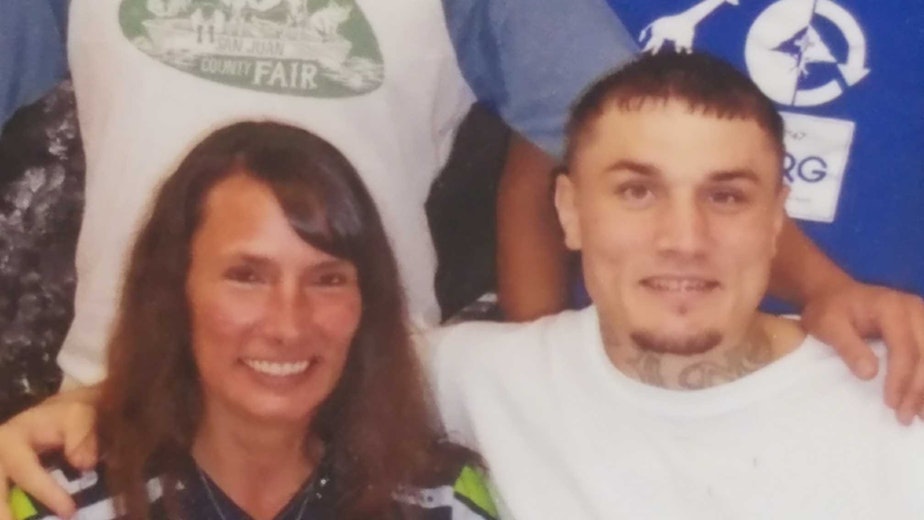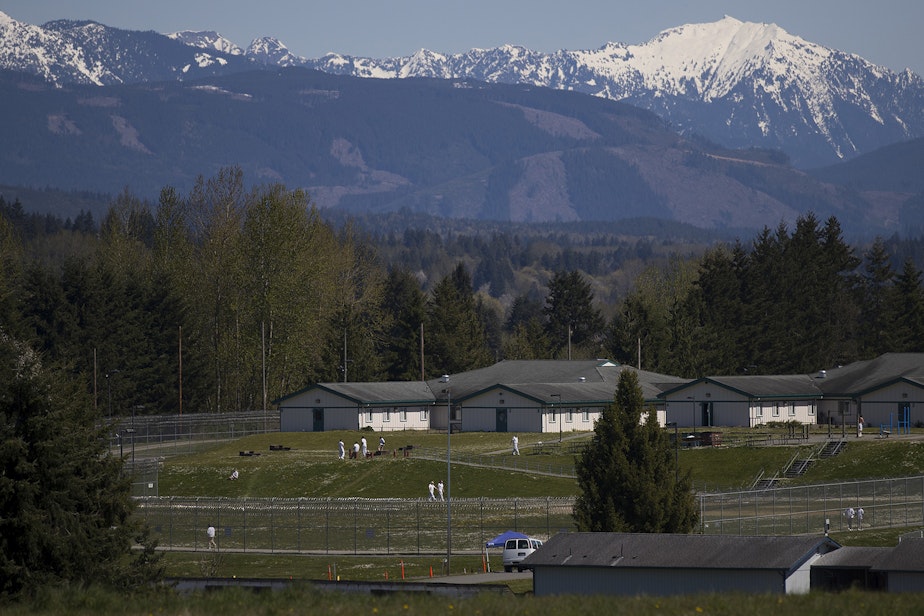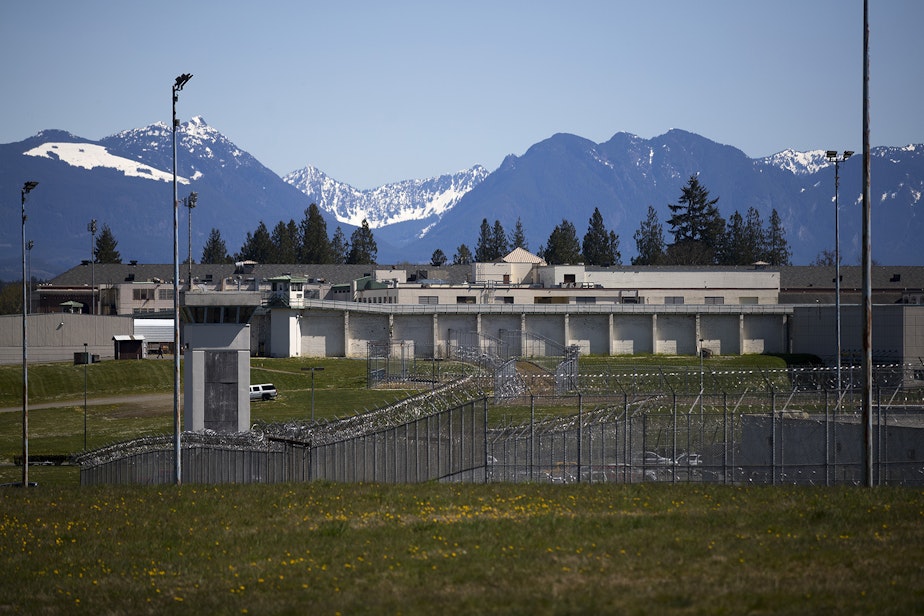'If I get this, I'll die,' the Monroe prison inmate said. Then he tested positive for Covid-19

Washington inmate Todd Sloan has Crohn's disease and ulcerative colitis. He's on Remicade, an immunosuppressive drug. He’s 28, and in the past two years, received treatment 11 times outside of prison at public hospitals. He’s lost 60 pounds.
April 6 was the last time he spoke with his mother Lisa Dunlap over the phone. He was crying.
“'I can’t get this disease mom. If I get this, I’ll die. It will kill me,'" Lisa Dunlap said, recounting what her son told her. He had been tested that day for coronavirus and was supposed to call back with his results the next day, but never did.
Nine days later, Dunlap got a phone call. The Washington State Department of Corrections told her that her son had tested positive for coronavirus and was placed in isolation.
Dunlap is one of many family members who have been agitating for more inmate protections.
At a press conference on Thursday, Twyla Kill, whose husband Terry Kill is also an inmate at the Monroe Correctional Complex, said families remain unsatisfied with the state's coronavirus approach.
"We want the right to monitor our loved ones and call 911 if they need an ambulance," Kill said. "We want to know that somebody is there to call 911, if they can't breathe."
On Wednesday, Inslee signed a proclamation to protect inmates in Washington state from coronavirus.
The governor had said earlier that the state would target five groups for release -- about 1,000 inmates deemed non-violent, and vulnerable offenders within months of release. Face coverings will be provided for inmates and staff, and free soap will be given to inmates.

Lisa Dunlap, Todd Sloan's mother, said her son is likely to qualify under the state's guidelines for release. He has underlying health conditions, has no violent offenses and only drug infractions. He's due to be released in November.
But she hasn't heard if her son would be released early.
"The Department of Corrections has taken significant action at my direction to address the threat of Covid-19 to the incarcerated population," Inslee said in press statement Wednesday.
"It can be difficult to maintain proper physical distancing in our correctional institutions and because of that, it makes sense to release certain individuals who may be at particularly high-risk during this outbreak," he said.
Jeremiah Bourgeois spent 27 years behind bars, for a violent offense he committed at the age of 14. He was released last year after being granted parole.
"Notwithstanding the fact that the indeterminate sentence review board found that I was not likely to re-offend, under the governor's order, I would still be there right now because I committed a violent crime," he said.
Bourgeois said the words the governor failed to use were "likely to recidivate."
"There are large classes of people in there, who have already been determined they do not pose a risk to public safety," he said. "Yet, they are excluded from this order, because of the idea that what they did long ago is relevant, with respect to what they will do now."
Risk assessment tools are available to make those determinations, he said.
State inmates remain without adequate personal protective equipment, and enough space to implement social distancing, family members said during the virtual press conference.
They said their concerns remain unchanged, even after Gov. Jay Inslee committed to improving the Covid-19 protective measures for those behind bars on Monday.
Nick Allen, lawyer with Columbia Legal Services, said he acknowledged the governor's steps to reduce the prison population in light of the Covid-19 pandemic. He attributed these actions to weeks of mounting pressure.
The governor’s moves come after weeks of community demand, confirmed cases in state prisons, a state Supreme Court lawsuit, and a subsequent court order for the state to immediately step in and protect inmates.
A lawsuit filed by Columbia Legal Services, on behalf of inmate petitioners in Washington state -- including inmate Terry Kill -- will have oral arguments before the Washington State Supreme Court beginning on April 23.
Allen said Inslee’s and the Department of Corrections plan does not spell out how these inmate releases would allow for social distancing in prisons. And that state release plans do not take equitable considerations into account.
The governor and the DOC have until Friday to file an updated report on the steps they have already taken in their implementation plan.
On noon on Thursday, families of incarcerated people and other advocates took to the streets to make noise in support of inmates. The demonstration was organized by the COVID-19 Mutual Aid Network.
Cars caravanned outside the governor's mansion in Olympia. Others drove the streets near the Women's Correctional Facility and the Monroe Correctional Complex where earlier this month, inmates there protested over Covid-19 concerns.
They have demanded that Gov. Inslee release thousands of vulnerable people, and also protect inmates who remain in state prisons. They said the state's order does not take into account people over 50, with underlying medical conditions.
Cassandra Butler, who has a family member who is incarcerated, said mass incarceration was a problem in the country long before Covid-19, and that it’s led to full prisons.
“The reason that's important to understand is because you'll hear Secretary Sinclair get on the television and say, ‘We are social distancing ... we're ensuring it's being practiced,’” Butler said. “It's not possible. Prisons have been overcrowded for years and years and years. They did not all of a sudden stop being overcrowded because of Covid-19.”

As for Lisa Dunlap, Todd Sloan's mother, she hasn't talked with her son since that early April phone call.
She's heard from prison staff who assured her Sloan is okay. She remains concerned, however, given that her son's definition of being well likely varies from the prison's, she said.
On Friday afternoon, Dunlap learned from a reporter that her son was not on a list of those inmates who will be released.
"I don’t want that to be the last conversation I have with my son," Dunlap said.




